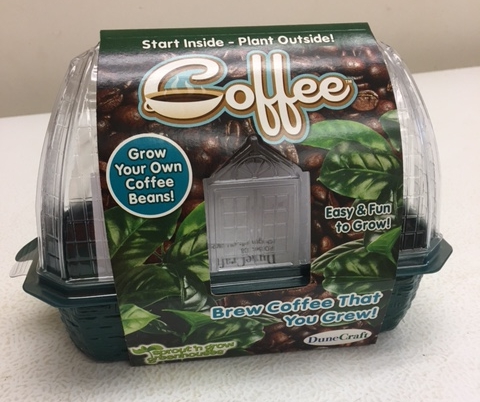Imported Coffee-Growing Kits Pulled From Long’s
 About 500 coffee-growing kits imported from the U.S. Mainland were pulled from shelves at Long’s Drugs stores statewide last week after the Hawai‘i Department of Agriculture was informed that the product was being sold.
About 500 coffee-growing kits imported from the U.S. Mainland were pulled from shelves at Long’s Drugs stores statewide last week after the Hawai‘i Department of Agriculture was informed that the product was being sold.
One kit in Kona was sold, in addition to the six on Kaua‘i and three on O‘ahu.Each coffee-growing kit contained several African coffee seeds, which are prohibited from being imported into Hawaii. (Photo attached) HDOA has a long-standing quarantine which requires that coffee plants and seeds for propagation be held in quarantine by HDOA for a minimum of one year before being released for planting to help assure that the plants are not carrying any diseases or pests. In addition, to import coffee plants, plant parts including seeds or green beans and used coffee bags, require a permit and certification of specific quarantine treatment.
Each coffee-growing kit contained several African coffee seeds, which are prohibited from being imported into Hawai‘i. HDOA has a long-standing quarantine which requires that coffee plants and seeds for propagation be held in quarantine by HDOA for a minimum of one year before being released for planting to help assure that the plants are not carrying any diseases or pests. In addition, to import coffee plants, plant parts including seeds or green beans and used coffee bags, require a permit and certification of specific quarantine treatment.
HDOA has a long-standing quarantine which requires that coffee plants and seeds for propagation be held in quarantine by HDOA for a minimum of one year before being released for planting to help assure that the plants are not carrying any diseases or pests. In addition, to import coffee plants, plant parts including seeds or green beans and used coffee bags, require a permit and certification of specific quarantine treatment.
In addition, to import coffee plants, plant parts including seeds or green beans and used coffee bags, require a permit and certification of specific quarantine treatment.
Preliminary investigations indicate that one shipment of the kits, which are manufactured by Dunecraft Inc. in Ohio, arrived in Hawai‘i on June 19, 2017. HDOA is continuing to investigate how the kits were shipped to Hawai‘i.
The coffee-growing kits were initially discovered by a customer on Kaua‘i on Tuesday, June 27, who saw the kits and knew that coffee plants and seeds were restricted in Hawai‘i. The customer contacted University of Hawai‘i personnel, who referred the discovery to HDOA’s Plant Pest Control Branch on Kaua‘i on June 28.
The Plant Quarantine was then notified and inspectors were dispatched to the retailer on Kaua‘i, where 12 kits were immediately pulled from the shelves.
HDOA’s Plant Quarantine Branch contacted Long’s and was informed that each of the 42 stores was sent 12 kits each. Both the retailer and the product distributor were informed that the kits cannot be sold and have been very cooperative and complying with the entire process.
Long’s has provided information that there are six kits that were sold on Kaua‘i and three kits on O‘ahu that are currently not accounted for. If individuals have purchased a kit, they should keep it contained and contact HDOA as soon as possible at 643-PEST (7378) statewide, or the Oahu Plant Quarantine Branch at (808) 832-0566.
“The consumer’s action to report this problem shows how the public plays a critical role in helping to protect Hawai‘i from agricultural and environmental pests,” said Scott Enright, chairperson of the Hawai‘i Board of Agriculture. “The department relies on the efforts of its many partners in the state, federal and public sector to help address Hawai‘i’s biosecurity.
Restrictions on coffee import were established to protect Hawai‘i’s major coffee industry from the introduction of diseases and pests from other areas of the world. The coffee berry borer, which has made its way to parts of Hawai‘i Island, O‘ahu, and recently, Maui, is native to Africa, where there are other serious pests and diseases such as coffee rust. Due to the lack of a large coffee-growing industry on the U.S. Mainland, national coffee import rules are not as strict as Hawai‘i’s.
“Even though a coffee seed may look clean on the surface, it may carry microscopic insect eggs, parasites and diseases that could be devastating to Hawai‘i’s coffee industry,” said Dr. John McHugh, administrator of HDOA’s Plant Industry Division. “The growing kits are a concern because the plants may eventually be planted outdoors and any associated insect pest or disease would be released into the environment. It is fortunate that these kits were discovered quickly.
“We are also very appreciative of the exemplary cooperation from Long’s which has been instrumental in helping us resolve this situation quickly,” McHugh added. “The department relies on positive working relationships with our retailers, dealers and shippers and we are happy that Long’s has been so responsive and responsible.”
The seeds in all the kits will be destroyed by HDOA.














